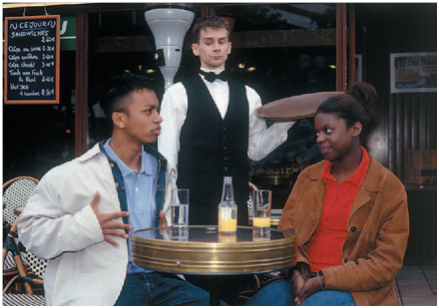Monsieur McKennaTeacher of French La vie est une fleur dont l’amour est le miel. -Victor Hugo“Life is a flower of which love is the honey.” Email: mckennaj@lcmrschools.com | Phone: (609) 884-3475LCMR School District - 687 Route 9, Cape May, NJ 08204 |
| HOME | French I | Foreign Language for Everyone | French Club | Links |
Unité 2 La vie courante
Leçon 3: Bon appétit! Leçon 3C: Ça fait combien?
OBJECTIVES
NOTE Culturelle L’argent européen (European money) In 2002, France and most of the European Union countries adopted a common currency: the euro (l’euro). The euro has the same value in all of these countries. It is also very convenient since you do not need to change money when you travel from one country to another. The euro is divided into 100 cents or centimes. The euro currency consists of 7 different bills and 8 different coins. The euro bills are of different colors and different sizes. The largest is worth 500 euros and the smallest 5 euros.
Pour communiquer How to ask how much something costs: C’est combien? How much is it? —C’est combien? How to ask a friend to lend you something: Prête-moi … Lend me …, Loan me … Prête-moi 30 euros, s’il te plaît.
→ Note that masculine nouns can be replaced by il and feminine nouns can be replaced by elle.
STRATEGY Speaking Linking words: When counting in euros, be sure to use the proper liaisons and elisions.
Warm up activities
Prononciation La consonne «r» The French consonant “r” is not at all like the English “r.” It is pronounced at the back of the throat. In fact, it is similar to the Spanish “jota” sound of José. Répétez: Marie Paris orange Henri Marie, prête-moi trente euros
Vidéo ActivitésVidéo Activités Worksheet
Audio Activités Audio Activités Worksheet
Les devoirs (homework)
Quiz 3 Script
|






